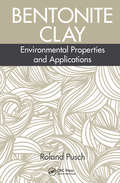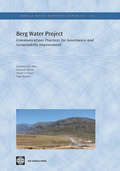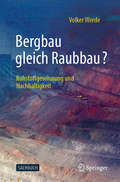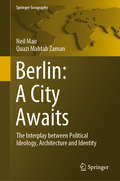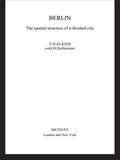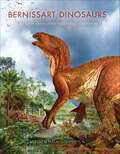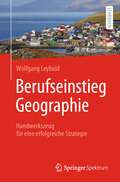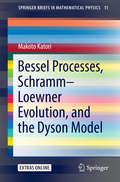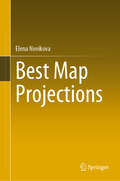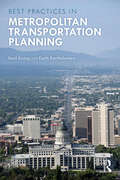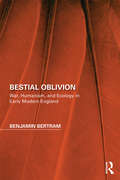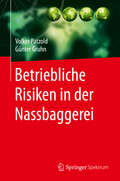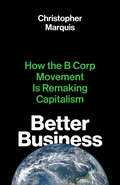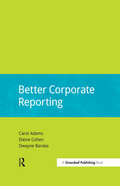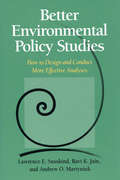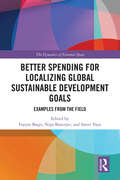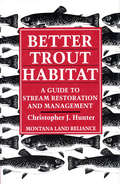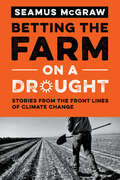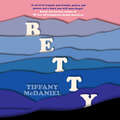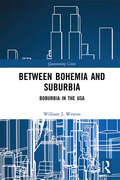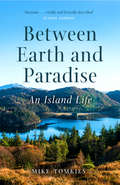- Table View
- List View
Bentonite Clay: Environmental Properties and Applications
by Roland PuschStudies the Environmental, Cosmetic, and Pharmaceutical Applications of Bentonite ClayBentonite clay, of which members of the smectite family of clay minerals are particularly important, has proven to be effective in sealing off wastes from groundwater. Bentonite Clay: Environmental Properties and Applications explores the mineralogy of clays in ge
Berg Water Project: Communication Practices for Governance and Sustainability Improvement
by Lawrence J. M. HaasThe past decade has witnessed a major global shift in thinking about water, including the role that water infrastructure plays in sustainable development. This rethinking aims to balance better the social, economic, and environmental performance aspects in the development and management of large dams. Infrastructure strategies must complement strategies for water, environment, and energy security and for emerging concerns to reduce vulnerability in water resource systems to climate change on the horizon. Communication is central to multi-stakeholder dialogue and partnerships at all levels needed to achieve sustainability and governance reform in water resource management and infrastructure provision. At the same time, communication drives the advocacy to mobilize political will and public support for beneficial change and continuous improvement in practices. This case study emphasizes that is not only important to mobilize all opportunities to reconcile water demand and supply in river basins that are coming under increasing levels of water stress, but also to integrate effectively governance and anti-corruption reforms and sustainability improvements into all stages of the planning and project cycle-adding value for stakeholders.
Bergbau gleich Raubbau?: Rohstoffgewinnung und Nachhaltigkeit
by Volker WredeRessourcenverknappung durch den Raubbau an der Natur, steigende Rohstoffpreise und die globale Krise der Rohstoffversorgung sind Bedrohungsszenarien, welche uns immer wieder beschäftigen und allzu oft als kaum abwendbares Schicksal erscheinen.Doch wie sieht die Rohstoffsituation in der Welt tatsächlich aus? Wie ist die Tatsache einzuordnen, dass die Menge der bekannten Rohstoffreserven entgegen der naheliegenden Vermutung tatsächlich schneller anwächst als der Rohstoffverbrauch? Müsste man anstelle der Gefahr von Ressourcenknappheit nicht viel eher von einer Rohstofffülle sprechen? Halten die fossilen Rohstoffe länger vor als die Regenerativen?Eine These dieses Buches ist, dass die Gewinnung von Rohstoffen grundsätzlich mit Eingriffen in den Naturhaushalt verbunden ist, die sich dennoch weitgehend umweltverträglich durchführen lassen. Anhand zahlreicher Fallbeispiele wird zudem veranschaulicht, weshalb vergangene Fehlentwicklungen und zweifellos bestehende Missstände keine spezifischen Probleme der Rohstoffwirtschaft darstellen, sondern eher als Abbild der jeweils herrschenden gesellschaftlichen Systeme zu deuten sind.
Berlin: The Interplay between Political Ideology, Architecture and Identity (Springer Geography)
by Quazi Mahtab Zaman Neil MairPolitical meaning in architecture has been a subject of interest to many critics and writers. The most notable of these include Charles T. Goodsell and Kenneth Frampton. In Goodsell's (1988) statement “Political places are not randomly or casually brought into existence” (ibid, p. 8), the stipulation is that architecture has been used very deliberately in the past to bolster connotations of power and strength in cities representative of larger nations and political movements. The question central to this book relates to how this can be achieved. Goodsell argues that any study of the interplay between political ideology, architecture, and identity, demands a place imbued with political ideas opposed to “cold concepts and lifeless abstractions” (Goodsell 1988, p. 1). As a means through which to examine and evaluate the ways in which the development of cities can be influenced by political and ideological tendencies, this book focuses on Berlin, as a political discourse, given its significant destruction and reorganisation to reinstate its identity in the context of geopolitics and the advent of globalisation.
Berlin: The Spatial Structure of a Divided City
by Dorothy Elkins T. H. Elkins B. HofmeisterThis anniversary study presents a readable, informative account of the development and current structure of Berlin.
Bernissart Dinosaurs and Early Cretaceous Terrestrial Ecosystems (Life of the Past)
by Pascal GodefroitIn 1878, the first complete dinosaur skeleton was discovered in a coal mine in Bernissart, Belgium. Iguanodon, first described by Gideon Mantell on the basis of fragments discovered in England in 1824, was initially reconstructed as an iguana-like reptile or a heavily built, horned quadruped. However, the Bernissart skeleton changed all that. The animal was displayed in an upright posture similar to a kangaroo, and later with its tail off the ground like the dinosaur we know of today. Focusing on the Bernissant discoveries, this book presents the latest research on Iguanodon and other denizens of the Cretaceous ecosystems of Europe, Asia, and Africa. Pascal Godefroit and contributors consider the Bernissart locality itself and the new research programs that are underway there. The book also presents a systematic revision of Iguanodon; new material from Spain, Romania, China, and Kazakhstan; studies of other Early Cretaceous terrestrial ecosystems; and examinations of Cretaceous vertebrate faunas.
Berufseinstieg Geographie: Handwerkszeug für eine erfolgreiche Strategie
by Wolfgang LeyboldWelche Berufswege stehen mir nach dem Geographiestudium offen? Was sind typisch geographische Stärken? Und wie kommuniziere ich diese erfolgreich meinem zukünftigen Arbeitgeber? Besonders für angehende Absolvierende der Geographie sind diese Fragen wichtig, da viele Arbeitgeber die Qualifikationen und die Faszination des Studienfaches Geographie nicht genau kennen. Die vielseitigen Spezialisierungsmöglichkeiten im Geographiestudium machen eine klare Kommunikation entscheidend für einen erfolgreichen Berufseinstieg. Der Autor lädt Sie auf eine spannende Reise in die mit Fragezeichen behaftete Arbeitswelt der Geographie ein: Sie entdecken angewandt und beispielhaft die unterschiedlichsten geographischen Berufsfelder. Sie erarbeiten wichtiges Handwerkszeug für Ihr Marketing in eigener Sache mit einer selbstbewussten und chancenorientierten Strategie. Zusätzlich beschäftigen Sie sich ausführlich mit Ihren Stärken, Ihrer Motivation und Ihrem Begeisterungsvermögen – mit dem Ziel, den potentiellen Arbeitgeber von Ihren Fähigkeiten zu überzeugen. Unterhaltsam geschrieben und auf beiden Perspektiven – des Geographen und des Recruitingberaters – beruhend, räumt das Buch mit der oft gestellten Frage auf: Was macht eine Geographin oder ein Geograph nach dem Studium eigentlich beruflich?
Bessel Processes, Schramm-Loewner Evolution, and the Dyson Model (SpringerBriefs in Mathematical Physics #11)
by Makoto KatoriThe purpose of this book is to introduce two recent topics in mathematical physics and probability theory: the Schramm-Loewner evolution (SLE) and interacting particle systems related to random matrix theory. A typical example of the latter systems is Dyson's Brownian motion (BM) model. The SLE and Dyson's BM model may be considered as "children" of the Bessel process with parameter D, BES(D), and the SLE and Dyson's BM model as "grandchildren" of BM. In Chap. 1 the parenthood of BM in diffusion processes is clarified and BES(D) is defined for any D ≥ 1. Dependence of the BES(D) path on its initial value is represented by the Bessel flow. In Chap. 2 SLE is introduced as a complexification of BES(D). Rich mathematics and physics involved in SLE are due to the nontrivial dependence of the Bessel flow on D. From a result for the Bessel flow, Cardy's formula in Carleson's form is derived for SLE. In Chap. 3 Dyson's BM model with parameter β is introduced as a multivariate extension of BES(D) with the relation D = β + 1. The book concentrates on the case where β = 2 and calls this case simply the Dyson model. The Dyson model inherits the two aspects of BES(3); hence it has very strong solvability. That is, the process is proved to be determinantal in the sense that all spatio-temporal correlation functions are given by determinants, and all of them are controlled by a single function called the correlation kernel. From the determinantal structure of the Dyson model, the Tracy-Widom distribution is derived.
Best Map Projections
by Elena NovikovaThis book presents the most condensed information about the theory of distortion theory developed by N.A. Tissot. It considers some of the issues of this theory to finding the best projections. Various criteria for ideal projections are analyzed. In finding an ideal projection using the Airy criterion for an arbitrary mapping region is solved by the variational method using the Euler–Ostrogradsky system of equations under natural boundary conditions. The same method is applied to a set of projections in which the sum of the extremal scale factors is equal to 2. It is shown that for these projections, the area distortions are quantities of the second order of smallness, while the linear distortions are quantities of the first order of smallness. The problem of finding the best projections using the Chebyshev criterion has been studied. Airy, Postel, Gauss–Kruger, and Markov projections are considered in detail.
Best Practices in Geotechnical and Pavement Engineering: Select Proceedings of IACESD 2023 (Lecture Notes in Civil Engineering #449)
by Sreevalsa Kolathayar N. Vinod Chandra Menon K. S. SreekeshavaThis book presents select proceedings of the International Conference on Interdisciplinary Approaches in Civil Engineering for Sustainable Development (IACESD 2023). The topics covered include emerging practices in geotechnical engineering and pavement, innovative approaches, and technologies to enhance the durability, sustainability, and performance of infrastructure, geosynthetics, geotechnical monitoring systems, and ground improvement techniques to address soil stability, settlement, and liquefaction issues. This book is useful for researchers and professionals’ geotechnical engineering.
Best Practices in Metropolitan Transportation Planning: New Advances, Approaches, And Best Practices
by Reid Ewing Keith BartholomewPlanning at a metropolitan scale is important for effective management of urban growth, transportation systems, air quality, and watershed and green-spaces. It is fundamental to efforts to promote social justice and equity. Best Practices in Metropolitan Transportation Planning shows how the most innovative metropolitan planning organizations (MPOs) in the United States are addressing these issues using their mandates to improve transportation networks while pursuing emerging sustainability goals at the same time. As both a policy analysis and a practical how-to guide, this book presents cutting-edge original research on the role accessibility plays - and should play - in transportation planning, tracks how existing plans have sought to balance competing priorities using scenario planning and other strategies, assesses the results of various efforts to reduce automobile dependence in cities, and explains how to make planning documents more powerful and effective. In highlighting the most innovative practices implemented by MPOs, regional planning councils, city and county planning departments and state departments of transportation, this book aims to influence other planning organizations, as well as influence federal and state policy discussions and legislation.
Bestial Oblivion: War, Humanism, and Ecology in Early Modern England (Perspectives on the Non-Human in Literature and Culture)
by Benjamin BertramAlthough war is a heterogeneous assemblage of the human and nonhuman, it nevertheless builds the illusion of human autonomy and singularity. Focusing on war and ecology, a neglected topic in early modern ecocriticism, Bestial Oblivion: War, Humanism, and Ecology in Early Modern England shows how warfare unsettles ideas of the human, yet ultimately contributes to, and is then perpetuated by, anthropocentrism. Bertram’s study of early modern warfare’s impact on human-animal and human-technology relationships draws upon posthumanist theory, animal studies, and the new materialisms, focusing on responses to the Anglo-Spanish War, the Italian Wars, the Wars of Religion, the colonization of Ireland, and Jacobean “peace.” The monograph examines a wide range of texts—essays, drama, military treatises, paintings, poetry, engravings, war reports, travel narratives—and authors—Erasmus, Machiavelli, Digges, Shakespeare, Marlowe, Coryate, Bacon—to show how an intricate web of perpetual war altered the perception of the physical environment as well as the ideologies and practices establishing what it meant to be human.
Betriebliche Risiken in der Nassbaggerei
by Volker Patzold Günter GruhnWie die in Nassbaggerei erfahrenen Autoren zeigen, ist der kapitalintensive Teil des Erdbaus im Nassen ein mitunter risikoreiches Geschäft. Die Risikohöhe wird vor allem durch oftmals große Mengenvordersätze, angetroffene Baugrundverhältnisse, ungenau beschriebene Hindernisse und Kontaminationen, klimatische Verhältnisse sowie ungeeignete Gerätewahl bestimmt. Bei Aufstellung der Preiskalkulation wird immer wieder der eine oder andere Risikofaktor nicht oder nur ungenügend für einen angemessenen Preis berücksichtigt. Die wesentlichen Risikofaktoren für verschiedene Gerätetypen benennen Patzold und Gruhn und erläutern sie anhand von Lastfällen. Sie stellen in einer Modellrechnung einen Kostenvergleich auf und schätzen den zu erwartenden Schaden ab, indem sie Risiken auf Basis von Expertenwissen abschätzen. Je nach Gerätetyp kann bei Berücksichtigung dieser Risiken im betrachteten Modellfall ein bis zum 3,6-fachen höherer Einheitspreis erforderlich werden. Ziel des Buches ist es, mit der Nassbaggerei Beschäftigte bei deren Planung, Preisbildung und Durchführung zu sensibilisieren und die Hinnahme von Risiken zu minimieren. Dr. -Ing. Volker Patzold absolvierte 1968 ein Bergbaustudium an der TU Clausthal-Zellerfeld und wurde 1970 an der TU Hannover promoviert. Nach 2005 nahm er einem Lehrbeauftrag über Nassbaggerei an der TU Bergakademie Freiberg, Institut für Tagebau, wahr. Nach seinem Studium war er in verschiedenen Firmen im Bereich des Wasser-, Straßen- und Tiefbaus sowie des Tagebaus tätig. Seit 1984 ist er mit seinem Ingenieurbüro für Naßbaggerei und Tagebau auf Steine und Erden in Buchholz i. d. Nde. selbständig. Prof. Dr. -Ing. habil. Dr. h. c. Günter Gruhn studierte Maschinenbau in Dresden mit Fachausbildung auf dem Gebiet Energie- und Verfahrenstechnik, wurde 1963 an der TU Dresden promoviert und habilitierte sich 1966. Von 1968 bis 1993 war er Professor für Systemverfahrenstechnik an der TH Leuna-Merseburg und bis zu seiner Emeritierung im Jahre 2003 Leiter des Instituts für Prozess- und Anlagentechnik an der TU Hamburg-Harburg.
Betriebsplanung im öffentlichen Personennahverkehr: Ziele, Methoden, Konzepte (VDI-Buch)
by Lars SchniederMit diesem Buch erhält der Leser einen umfassenden Einblick in alle für die Planung, Durchführung und Kontrolle des Betriebs öffentlicher Personenverkehrssysteme (ÖPNV) relevanten Aufgaben. Eine besondere Beachtung finden hierbei verkehrsträgerspezifische Besonderheiten, da der Betrieb öffentlicher Personenverkehrssysteme unterschiedlichen Randbedingungen und einer großen Bandbreite einwirkender Störgrößen unterliegt. Die vergleichende Darstellung der Merkmale der Verkehrsträger sowie deren Auswirkung auf die Betriebsplanung fördert das Verständnis der planerischen Aufgaben. Das Buch "Betriebsplanung im öffentlichen Personennahverkehr" ist eine ganzheitliche und übersichtlich strukturierte Darstellung der einzelnen Planungsschritte in Verkehrsunternehmen in ihrem Zusammenhang. Vorhandene Methoden und Lösungsmöglichkeiten werden zusammengestellt und vergleichend diskutiert. Das Buch schließt die bestehende Lücke in der Fachliteratur. Es richtet sich an Angebotsplaner in Verkehrsverbünden, Betriebsplaner in Verkehrsunternehmen sowie planerisch tätigen Mitarbeitern in Ingenieurbüros. Studierende der Verkehrswissenschaften finden im vorliegenden Buch die für die beruflichen Aufgaben notwendige fachliche Vertiefung.
Better Business: How the B Corp Movement Is Remaking Capitalism
by Christopher MarquisA compelling look at the B Corp movement and why socially and environmentally responsible companies are vital for everyone&’s future Businesses have a big role to play in a capitalist society. They can tip the scales toward the benefit of the few, with toxic side effects for all, or they can guide us toward better, more equitable long-term solutions. Christopher Marquis tells the story of the rise of a new corporate form—the B Corporation. Founded by a group of friends who met at Stanford, these companies undergo a rigorous certification process, overseen by the B Lab, and commit to putting social benefits, the rights of workers, community impact, and environmental stewardship on equal footing with financial shareholders. Informed by over a decade of research and animated by interviews with the movement&’s founders and leading figures, Marquis&’s book explores the rapid growth of companies choosing to certify as B Corps, both in the United States and internationally, and explains why the future of B Corporations is vital for us all.
Better Corporate Reporting (Doshorts Ser.)
by Carol Adams Elaine Cohen Dwayne BarakaBetter Corporate Reporting outlines the latest frameworks for enhancing non-financial and sustainability reporting. It shows you how to integrate non-financial data into your reporting and overall strategy, creating long-term value, trust and transparency. It includes guides to: the International Integrated Reporting Council's new framework; the Global Reporting Initiative's G4 framework; and a detailed look at the concept at the heart of both of these new frameworks, materiality. It is the compilation of 3 bestselling sustainability guides on sustainability reporting.Understanding Integrated Reporting provides a practical and expert distillation of the new IR framework released by the International Integrated Reporting Council in December 2013. It explains what IR is and how to do it; how it links with other reporting frameworks and what it means in terms of thinking and processes. You'll also get a clear business case for IR and insights and best practice examples from leading integrated reporters. The Global Reporting Initiative (GRI) G4 Sustainability Reporting Framework was launched in May 2013. In Understanding G4, corporate reporting veteran Elaine Cohen presents an easy-to-follow review of everything any organization needs to know to decide whether to use the G4 Framework and if so, how. Materiality is the lynch-pin that can align your sustainability initiatives with your overall strategy. Making Sustainability Matter shows you how to identify your organization's most material sustainability issues, allocate resources to sustainability initiatives for optimal returns; connect your communications and reporting to materiality, and; clarify which issues are important to your stakeholders. Materiality is a core concept in both the GRI's new G4 framework the IIRC's new Integrated Reporting framework.
Better Environmental Policy Studies: How To Design And Conduct More Effective Analyses
by Lawrence Susskind Ravi K. Jain Andrew O. MartyniukEnvironmental policy studies commissioned by government agencies or other stakeholders can play a vital role in environmental decisionmaking; they provide much-needed insight into policy options and specific recommendations for action. But the results of even the most rigorous studies are frequently misappropriated or misunderstood and are as likely to confuse an issue as they are to clarify it. Better Environmental Policy Studies explores this problem, as it considers the shortcomings of current approaches to policy studies and presents a pragmatic new approach to the subject. Reviewing five cases that are widely regarded as the most effective policy studies to have been conducted in the United States in the last few decades, the authors present a comprehensive guide to the concepts and methods required for conducting effective policy studies. The book: *describes and explains the conventional approach to policy studies and its shortcoming *presents the history, impacts, and common elements of five successful policy studies *offers an in-depth look at the different tools and techniques of policy analysis *extends the concepts and principles of successful policy studies to their potential uses in the international arena Better Environmental Policy Studies presents a practical, battle-tested approach to overcoming the obstacles to formulating effective environmental policy. It is an invaluable resource for students and faculty in departments of environmental studies, public policy and administration, and planning, as well as for professional policy analysts and others involved with making decisions and mediating disputes over environmental issues.
Better Spending for Localizing Global Sustainable Development Goals: Examples from the Field (The Dynamics of Economic Space)
by Sanni Yaya Fayyaz Baqir Nipa BanerjeeThis book centers around an intense debate among donors, policymakers, development practitioners, and academics on the efficacy of aid in eradicating poverty while promoting human development. It seeks to fill the gap in present literature by presenting stories of better spending through implementing Sustainable Development Goals and addressing Agenda 2030 via indigenization of global development goals with initiatives at local and national levels. The book adopts an innovative approach to dealing with aid effectiveness by highlighting the relevance of better spending, rather than excessive spending. It does so with real-life examples of interventions made in the Global South to realize the vision of "thinking globally and acting locally". These case studies speak to the significance of communities’ role in shouldering responsibility for planning, financing, operating, and maintaining local developmental initiatives. The examples also demonstrate how aid serves its purpose when used as an investment in communities and enterprising individuals, in order to realize the strategic impact of giving and build a local "receiving mechanism" for indigenizing and achieving global development goals. The book references cases of better spending by governments, philanthropists, and civil society organizations (CSOs) from across Asia, Africa, and Latin America on a range of issues and will, thus, be of interest to development practitioners, policymakers, donors, philanthropists, civil society organizations, and academics and students of international development studies.
Better Trout Habitat: A Guide To Stream Restoration And Management
by Montana Land Reliance Christopher J. HunterBetter Trout Habitat explains the physical, chemical, and biological needs of trout, and shows how climate, geology, vegetation, and flowing water all help to create trout habitat.
Betting the Farm on a Drought: Stories from the Front Lines of Climate Change
by Seamus McGrawA lively, thought-provoking overview of climate change from the perspectives of people who are dealing with it on the ground.Climate change has become one of the most polarizing issues of our time. Extremists on the left regularly issue hyperbolic jeremiads about the impending destruction of the environment, while extremists on the right counter with crass, tortured denials. But out in the vast middle are ordinary people dealing with stronger storms and more intense droughts than they’ve ever known. This middle ground is the focus of Betting the Farm on a Drought, a lively, thought-provoking book that lays out the whole story of climate change—the science, the math, and most importantly, the human stories of people fighting both the climate and their own deeply held beliefs to find creative solutions to a host of environmental challenges.Seamus McGraw takes us on a trip along America’s culturally fractured back roads and listens to farmers and ranchers and fishermen, many of them people who are not ideologically, politically, or in some cases even religiously inclined to believe in man-made global climate change. He shows us how they are already being affected and the risks they are already taking on a personal level to deal with extreme weather and its very real consequences for their livelihoods. McGraw also speaks to scientists and policymakers who are trying to harness that most renewable of American resources, a sense of hope and self-reliance that remains strong in the face of daunting challenges. By bringing these voices together, Betting the Farm on a Drought ultimately becomes a model for how we all might have a pragmatic, reasoned conversation about our changing climate.“This title deserves a wide and varied readership; it has the power to change minds.” —Booklist“Seamus McGraw has created not just an important document regarding climate change and the future of our planet but a wonderful and truthful portrait of America. You feel like you’re on the road with him, cruising down little-traveled streets to meet fascinating characters whom you’d never see on Fox News or CNN. A terrific book.” —A. J. Baime, author of White Lies: The Double Life of Walter F. White and America’s Darkest Secret“Effectively blending story, science, and context, this engaging, readable book will be invaluable for those studying or working on issues associated with climate change, especially those with a social science or policy focus.” —Choice
Betting the Farm on a Drought: Stories from the Front Lines of Climate Change
by Seamus McGrawA lively, thought-provoking overview of climate change from the perspectives of people who are dealing with it on the ground.Climate change has become one of the most polarizing issues of our time. Extremists on the left regularly issue hyperbolic jeremiads about the impending destruction of the environment, while extremists on the right counter with crass, tortured denials. But out in the vast middle are ordinary people dealing with stronger storms and more intense droughts than they’ve ever known. This middle ground is the focus of Betting the Farm on a Drought, a lively, thought-provoking book that lays out the whole story of climate change—the science, the math, and most importantly, the human stories of people fighting both the climate and their own deeply held beliefs to find creative solutions to a host of environmental challenges.Seamus McGraw takes us on a trip along America’s culturally fractured back roads and listens to farmers and ranchers and fishermen, many of them people who are not ideologically, politically, or in some cases even religiously inclined to believe in man-made global climate change. He shows us how they are already being affected and the risks they are already taking on a personal level to deal with extreme weather and its very real consequences for their livelihoods. McGraw also speaks to scientists and policymakers who are trying to harness that most renewable of American resources, a sense of hope and self-reliance that remains strong in the face of daunting challenges. By bringing these voices together, Betting the Farm on a Drought ultimately becomes a model for how we all might have a pragmatic, reasoned conversation about our changing climate.“This title deserves a wide and varied readership; it has the power to change minds.” —Booklist“Seamus McGraw has created not just an important document regarding climate change and the future of our planet but a wonderful and truthful portrait of America. You feel like you’re on the road with him, cruising down little-traveled streets to meet fascinating characters whom you’d never see on Fox News or CNN. A terrific book.” —A. J. Baime, author of White Lies: The Double Life of Walter F. White and America’s Darkest Secret“Effectively blending story, science, and context, this engaging, readable book will be invaluable for those studying or working on issues associated with climate change, especially those with a social science or policy focus.” —Choice
Betty: The International Bestseller
by Tiffany McDaniel'Breahtaking'Vogue'So engrossing! Betty is a page-turning Appalachian coming-of-age story steeped in Cherokee history, told in undulating prose that settles right into you'Naoise Dolan, Sunday Times bestselling author of Exciting Times 'I felt consumed by this book. I loved it, you will love it' Daisy Johnson, Booker Prize shortlisted author of Everthing Under'I loved Betty: I fell for its strong characters and was moved by the story it portrayed' Fiona Mozley, Booker Prize shortlisted author of Elmet 'A girl comes of age against the knife.' So begins the story of Betty Carpenter. Born in a bathtub in 1954 to a Cherokee father and white mother, Betty is the sixth of eight siblings. The world they inhabit is one of poverty and violence - both from outside the family and also, devastatingly, from within. When her family's darkest secrets are brought to light, Betty has no choice but to reckon with the brutal history hiding in the hills, as well as the heart-wrenching cruelties and incredible characters she encounters in her rural town of Breathed, Ohio.Despite the hardship she faces, Betty is resilient. Her curiosity about the natural world, her fierce love for her sisters and her father's brilliant stories are kindling for the fire of her own imagination, and in the face of all she bears witness to, Betty discovers an escape: she begins to write.A heartbreaking yet magical story, Betty is a punch-in-the-gut of a novel - full of the crushing cruelty of human nature and the redemptive power of words. 'Not a story you will soon forget' Karen Joy Fowler, Booker Prize shortlisted author of We Are All Completely Beside Ourselves 'Shot through with moonshine, Bible verses, and folklore, Betty is about the cruelty we inflict on one another, the beauty we still manage to find, and the stories we tell in order to survive' Eowyn Ivey, author of The Snow Child
Betty: The International Bestseller
by Tiffany McDaniel'NOT A STORY YOU WILL SOON FORGET' Karen Joy Fowler, author of Man Booker Prize finalist We Are All Completely Beside Ourselves'A girl comes of age against the knife.' So begins the story of Betty Carpenter. Born in a bathtub in 1954 to a Cherokee father and white mother, Betty is the sixth of eight siblings. The world they inhabit is one of poverty and violence - both from outside the family and also, devastatingly, from within. When her family's darkest secrets are brought to light, Betty has no choice but to reckon with the brutal history hiding in the hills, as well as the heart-wrenching cruelties and incredible characters she encounters in her rural town of Breathed, Ohio.Despite the hardship she faces, Betty is resilient. Her curiosity about the natural world, her fierce love for her sisters and her father's brilliant stories are kindling for the fire of her own imagination, and in the face of all she bears witness to, Betty discovers an escape: she begins to write.A heartbreaking yet magical story, Betty is a punch-in-the-gut of a novel - full of the crushing cruelty of human nature and the redemptive power of words.
Between Bohemia and Suburbia: Boburbia in the USA (Questioning Cities)
by William J. WestonThis book identifies a distinctive kind of urban neighborhood that is on the rise throughout the USA, the dense, walkable, mixed-use bourgeois-bohemian suburb or the "boburb." It looks at case studies of areas to live in Louisville, Kentucky. Based on scores of interviews with college graduates, backed by survey data and Census figures, it provides a clear, historical account of how these spaces arose. Chapters depict, analyze, and compare the Highlands neighborhood with other Louisville boburbs, contrasting them with the ephemeral bohemian quarters and the many suburban subdivisions. The Highlands are also compared with five other boburbs around the USA. Attention is given to the influence of transportation systems in shaping residential, community, and commercial spaces. Deeper cultural reasons for choosing the boburbs or the suburbs are also explored, including the political "big sort" between liberal and conservative places, and Bourdieu’s account of how the distinction between economic and cultural capital shapes how people choose to live where they live. This book will appeal to those interested in the evolution and distinctions among urban neighborhoods. It is ideal for academics and students within urban geography, urban gentrification, cities, and population.
Between Earth and Paradise: An Island Life
by Mike Tomkies&“One man&’s search for peace and beauty in an increasingly frenetic world has never read so well or so evocatively.&” —Eifion Rees, Shooting Times & Country Magazine After giving up a hectic life as a journalist in Europe and Hollywood in the late 1960s to return to his boyhood love of nature, Mike Tomkies moved to Eilean Shona, a remote island off the west coast of Scotland. There he rebuilt an abandoned croft house and began a new way of life observing nature. He tracked foxes and stags, made friends with seals, and taught an injured sparrow-hawk to hunt for itself. It was the indomitable spirit of this tiny bird that taught Tomkies what it takes for any of us to be truly free. Whether he was fishing, growing his own food, or battling through stormy seas in a tiny boat, he learned that he could survive in the harsh environment. This is the astonishing story of daring to take the first step away from urban routines and embracing a harsh yet immensely rewarding way of life which, in turn, led Tomkies to an even more remote location and inspired an acclaimed series of books on various animals and the challenges and joys of living in remote places. &“The awesome extent of his struggle to build an uncomfortable but self-supporting writer&’s life alone in an isolated crofter&’s cottage is vividly and lyrically described.&” —Sunday Express &“A treasure house of outdoor knowledge . . . It should be read slowly to fully appreciate its value.&” —Rennie McOwan, Scots Magazine
